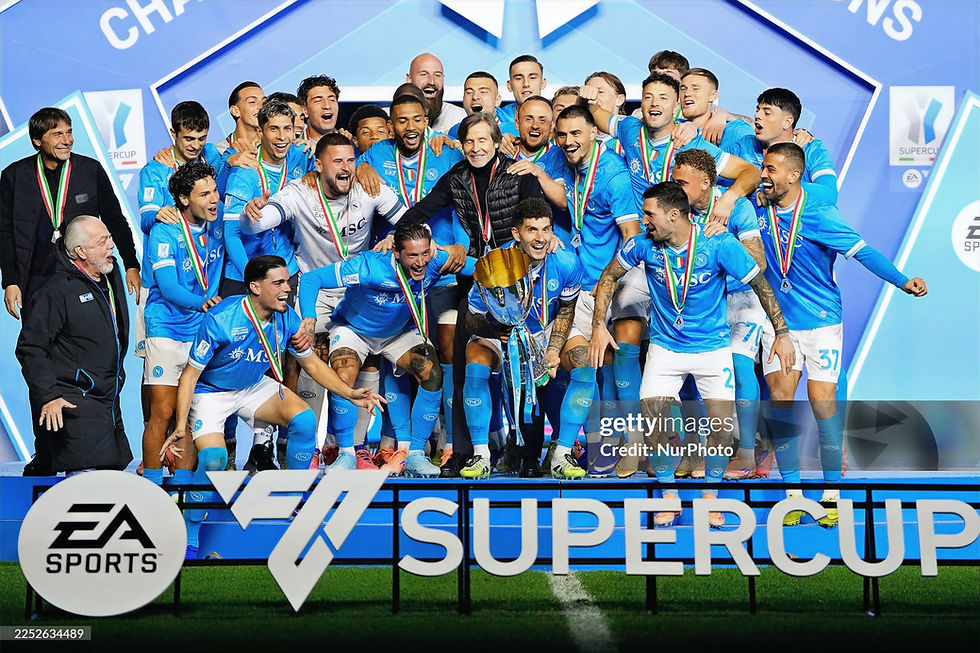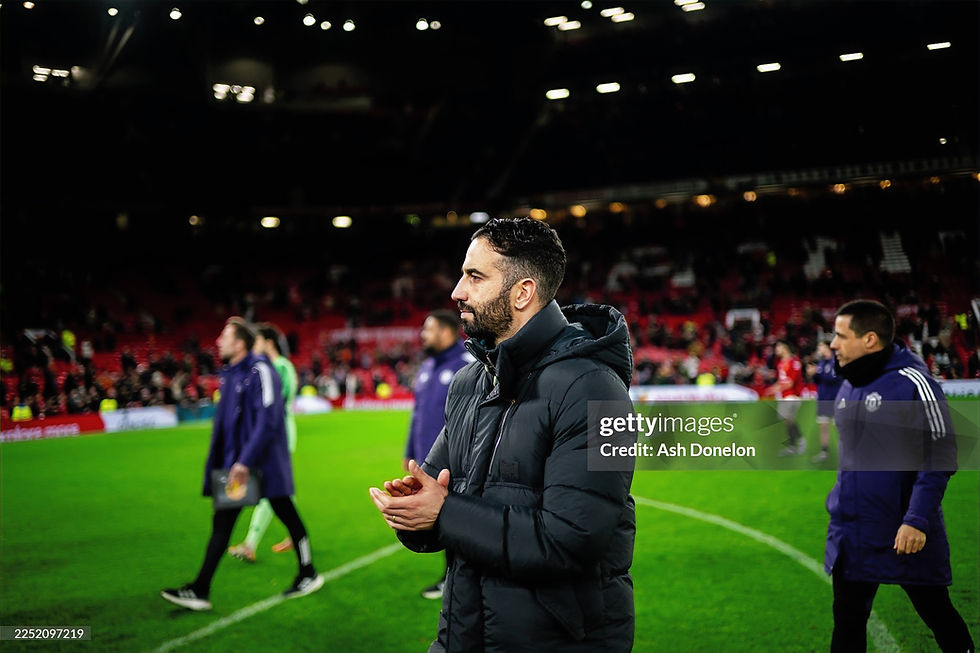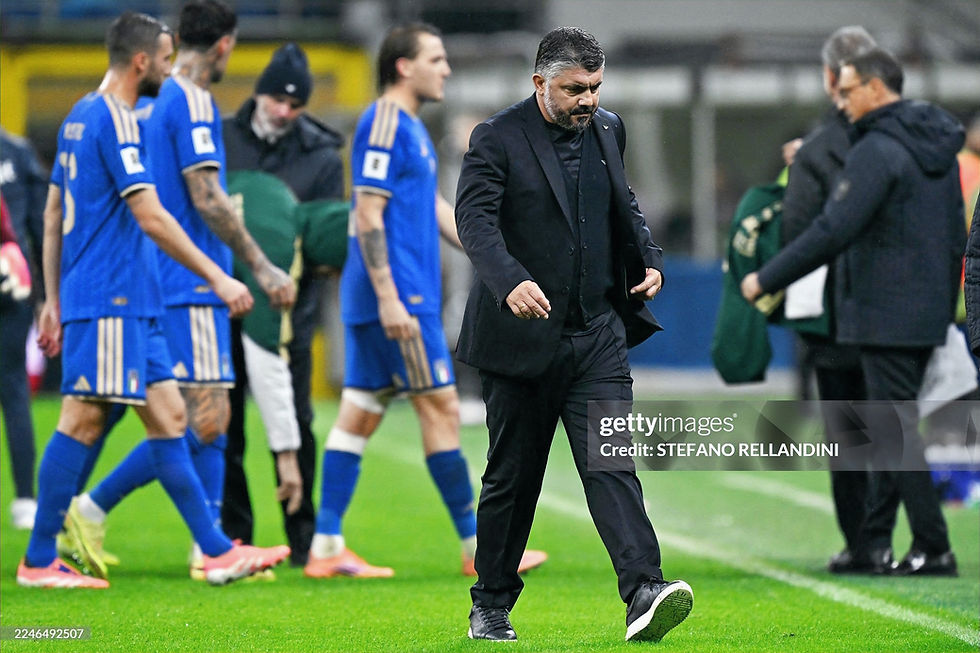The Beautiful Game - Not so beautiful anymore?
- Christian Paris
- Apr 10, 2025
- 4 min read

A hot topic of discussion among supporters around the globe seems to be frequently dismissed in the mainstream media, until recently when Gary Neville’s notable criticism of the most recent instalment of the Manchester derby featured disappointment and anger towards the robotic direction that football has headed in over recent seasons.
It remains a subject of discourse in football that needs more attention. The dull stalemate at Old Trafford was not the first example of the current state of the sport we all love, and it unfortunately won’t be the last at this rate.
Such focus and demand on positions, structure and systems has no doubt seen a natural evolution of football, and for that we cannot complain too harshly, but it has meanwhile taken away players’ freedom to express their imagination and innovation. It has made the most unpredictable of sports, somewhat predictable.
Hardly ever now do we now see individual moments of magic, and it is frankly difficult to pin this current state on any one person or team, rather a combination of components. Pep Guardiola’s immense influence on the game has notably seen various adaptations and attempted recreations of his specific principles and style, particularly in England – but to what end?

You cannot solely criticise Guardiola for this. The Spaniard has dominated wherever he has gone, more recently in the place where it was said his possession-based style could not succeed. Six Premier League titles in eight seasons is not bad, whilst playing exceptional football to match.
Ironically, Kevin De Bruyne’s anticipated departure at the end of this campaign feels like the withdrawal of one of the few remaining stars at the top of the sport whose brilliance relied on imagination and off the cuff thinking, rather than being restricted to an area of the pitch or having to depend on a system to influence a match.
This is not to say this robotic and systematic nature in football has completely taken over every aspect of the sport, there still remains modern iterations and versions of teams that still welcome and importantly thrive on the individual liberty it provides.
Luis Enrique’s PSG this season springs to mind immediately. Ousmane Dembele, sparkling in a system that does not shoehorn him into a specific role, has allowed such a talent to cause havoc wherever he sees fit. It has seen the Frenchman produce a terrific campaign in the French capital.
Desiree Doue, Khvicha Kvaratskhelia, and Bradley Barcola have also thrived in this free-flowing side, but what remains the difference between Enrique’s idea and others in Europe?
There still exists a system, and structure, but more poignantly the freedom, individual quality and speed of play, coupled with terrific intensity has enabled this young PSG side to grow into one of the best sides to watch this season.

Catalan giants Barcelona are another prime example of a side that lets their stars shine. Hansi Flick’s arrival last summer has proven to be a timely one following a turbulent recent history, whilst his influence has made an immediate impact on an extremely talented squad.
Despite Lamine Yamal’s already established potential, the starlet has been given the licence to dominate in LaLiga, and whilst it has been predominantly from the right, the point remains Yamal has been enabled by Flick to express his superb attacking qualities. The importance of this cannot be underestimated, particularly at 17 years of age.
We cannot disregard the role of Spain national team head coach Luis de la Fuente in Yamal’s rise. The youngster broke-through during the Euro 2024 triumph, and it again came down to the freedom he was given, even in such a pressurised environment. These young talents cannot be shackled, but a tendency to restrain attackers especially has crept in.
How much responsibility can we place onto managers, or what we call head coaches today. There certainly must be accountability, particularly when we consider the state of football not just at professional level, but across different age-groups and at grassroots.
Young footballers at developmental stages are now often shoehorned into set positions and roles, wingers asked to stay wide and be patient, midfielders are now needed to maintain their positions and rarely veer away, and centre forwards now seem more interested in coming to feet and getting involved, than spinning in behind and producing magic in front of goal.
Is this down to the constantly increasing spotlight put onto managers in the modern game, that has arguably seen the starpower shift from the players to those in the dugout. It appears that modern football has become victim to the constant need to micromanage every single facet, of every single minute, of every single game.

It’s difficult to ignore the impact the current state of football will have on younger generations, and future ones. The reason so many kids grow a love for the beautiful game is through watching their favourite players, stars producing a moment of brilliance.
Whether it be Lionel Messi or Neymar beating five players in a flash, Wayne Rooney or Steven Gerrard scoring a 30-yard screamer, or Cristiano Ronaldo beating Gianluigi Buffon with a freakish overhead kick. Who can kids look up to now? Who is there to inspire?
And it's not just about some of the best players of the past, but about the moments they produce. That is what fans remember. The legacy they leave behind.
This rapid infatuation with goals and assists, that now rules how players are judged, praised or criticised has played a major part. Instead of comparing by watching, we can now just search how many goals a player scored and determine that they are better.
What about the players that make you want to watch a match, just to see them. The artists, those who made you want to copy them immediately in the garden. They are now hard to come by.
Again, this is certainly part of the natural cycle that football goes through. Where it was once more flexible, open and free flowing game, with teams that could adapt styles during matches, it has now become a sport defined by a philosophy, a style of play with no exception. And whilst we must accept this, it continues to be a trying task.





Comments